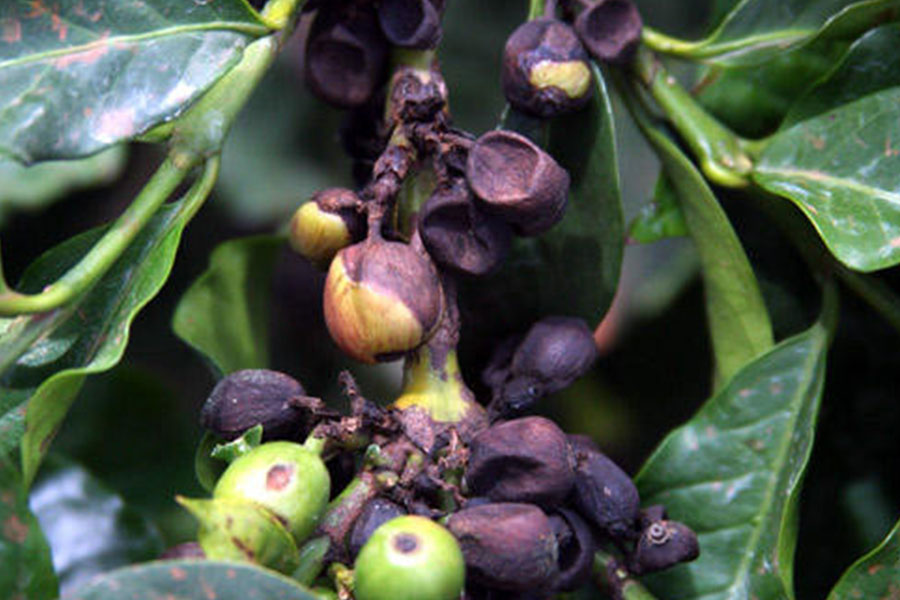
Mathewos Lankemu, a farmer in his early 40s, was born and raised in Nekiya Kebele, Sidama Zone, one of the major coffee producing regions in the country.
Born into an extended family, he was the sixth child to his family. In his early days, Mathewos wanted to be a businessperson. He even opened a small business here, and after that, he dropped out of school in grade nine.
But when his father bestowed his children with land and property, according to the custom of the place, Mathewos got a hectare of land.
Growing up close to the livelihood and already knowing the ins and outs of the practice, he decided to give being a farmer a try.
The land he received already had some coffee plantations on it. He removed his father’s old coffee trees, which had been there for a while, and planted new, improved seeds on a half hectare of land. On the other half, he planted false banana (Ensete ventricosum) and sugarcane.
As he was getting a good income from his land, he decided to continue being a farmer. Mathewos got married and fathered four children, whom he supports with the income he gets from his farm.
Being an active member of the community, he became chairperson of Fero Cooperative Union, an association of coffee farmers in the area.
“Coffee trade is very much characterised by price swings,” said Mathewos. “Sometimes its goes way up, and at other times it gets low.”
However, he says this year was very different. Though he was able to produce 2,200Kg of coffee, a considerable amount compared to his previous harvests, the income he got for his commodity was in fact less.
"Decreased coffee prices meant that I was getting less money than I used to get," said Mathewos.
Last year Mathewos was getting 11 Br for a kilo of coffee, but this year he was only able to get nine Birr a kilo.
Mathewos and his cooperative union supply their coffee to the Sidama Coffee Farmers Cooperative Union, the second-largest union of coffee growing farmers in Ethiopia next to Oromia Coffee Farmers Cooperative Union.
Sidama Coffee Farmers Cooperative Union is made up of around 70,000 farmers organised under 57 associations and primary cooperative societies. The Union receives coffee from the associations, exports it and pays back dividends to the associations.
The country was able to export a record number of 239,144tn of coffee this year and bag 774.1 million dollars from these exports. However, revenue saw a decline of 9.4pc from last year.
The union, just like Mathewos, was able to increase the amount of coffee it exported by 10pc. However, the revenue it got was below the year before.
"Since we provide speciality coffee that is traceable, we directly export our coffee and can get higher prices than the market price," said Tsegaye Amebo, general Manager of Sidama Coffee Farmers Cooperative Union.
“However, the prices we get are affected by the global market price,” said Tsegaye. “Because of declining global coffee prices, our revenues also decline with it.”
This year saw the lowest global coffee prices in 13 years, and the price reached as low as 0.87 dollars for a pound of coffee, a figure much lower than the price registered in 2011, which was 2.5 dollars. Globally, the price of coffee has been decreasing for the past two years.
A lot of factors affect global coffee prices. Among these, weather, the flowering cycle of the coffee trees, supply and stock are mentioned. Around 50pc of the world's coffee is roasted by four companies. The stock these companies hold has a direct impact on coffee prices.
Apart from the global prices being low, local factors like political instability in some areas resulted in the failure of collecting the beans on time, as well as the blocking of transport roots, according to the Ethiopian Coffee, Tea Development & Marketing Authority.
However, the Authority says it worked on increasing the amount of coffee production so that the price deficit would be balanced. The country managed to export a record number of 239,144tn of coffee this year.
Ethiopia was able to bag 774.1 million dollars from the export of coffee. However, with the decrease in global prices, the revenue also saw a decline of 9.4pc from last year.
Ethiopia has around 442 coffee exporters, though only 290 are active. It also has about 5.3 million coffee farmers who cultivate 1.6 million hectares of land.
Creating better market linkages, better branding and promotion of Ethiopian Coffee, as well as improved regulation of the coffee trade chain, were the reasons attributed by the Authority for the higher export volume.
The Authority has been going through institutional and legal reforms for the past two years after it was re-established with the primary goal of creating an entity to oversee all aspects of the sector.
"After the Ministry of Coffee was dissolved around three decades ago, there has not been an entity that took the sole responsibility for the sector," said Hairu Nuri, market information and regulatory director at the Authority.
The Authority aims to boost the sector by introducing new reforms. One of these reforms is better regulation of the coffee trade and value chain.
In the just-ended fiscal year, the Authority took administrative measures on exporters after investigating the records of exports of the past years.
By working with the Ministry of Revenues, the National Bank of Ethiopia and the Ethiopian Commodity Exchange, the Authority filtered out exporters that were engaged in illicit trading, according to Hairu.
"Some exporters after buying export coffee from ECX either didn’t export the coffee, sold it to other companies outside of their contract or didn’t deposit the forex with the National Bank," said Hairu.
The Authority issued warnings to 226 exporters, while it revoked the licenses of 16 exporters. While the 226 exporters were the ones that came to the Authority to explain their situation, the 16 were the ones the Authority was not able to trace.
"We've transferred their files to the Office of the Attorney General, and legal proceedings will begin soon," said Hairu.
Another big challenge the Authority is dealing with is under-invoicing. The Authority claims a growing number of exporters are engaging in the business with the sole purpose of getting foreign exchange to import other commodities.
“The exporters are selling the coffee on the international market below the market price in a bid to quickly get the money,” said Hairu. “Though the act is not profitable, they add their loss to their profit margin on the commodities they import, which creates inflated prices here.”
It is not only the export of coffee that is being affected by under-invoicing, but other exports of agricultural commodities are also affected, according to the Ministry of Trade & Industry.
The Ministry blames under-invoicing as one of the major causes for the declining export revenue besides political instability, low quality of the commodities, volatile global prices, electric power interruptions and growing contraband trade.
Ethiopia’s earnings from exports in the current fiscal year stood just under 2.7 billion dollars, a 6pc decline from the year before. This was also well below its target of 4.3 billion dollars.
Between 55pc and 80pc of the illicit financial outflows leaving Ethiopia are traded using under-invoicing, which amounts to an estimated six percent to 23pc of the total value of the country’s trade, according to data from Global Financial Integrity, a Washington, DC-based think tank that produces an analysis of illicit financial flows.
Three months ago the Ministry sent a warning letter to sesame exporters suspected of under-invoicing.
Signed by Misganu Arega, state minister for Trade & Industry, the letter urged the exporters to shy away from under-invoicing and threatened to take measures against those involved in under-invoicing from revoking their business license to a legal proceeding.
While the warning letter was sent to sesame exporters, the investigation of coffee exporters suspected of engaging in under-invoicing is still ongoing.
"We're currently identifying the exporters and will soon reveal the findings and measures we will take," said Hairu.
Experts in the area call for tighter law enforcement and strict regulations to curb the practice.
The country has the framework as well as the technology to identify those engaged in under-invoicing, according to Hussein Mohammed (PhD), a lecturer at Hawassa University's School of Horticulture & Plant Science.
The whole reason such actions became widespread is because of the lack of regulations and failure to take action, according to him.
Besides, he suggests that the only way the country can withhold the global market fluctuation is through exporting value-added coffee.
The Authority agrees with Hussein and says it has been working on improving the coffee trade chain to get better revenue from the sector.
The Authority has been giving incentives for those engaged in exporting roasted coffee. Last year 51 new exporters acquired licenses to export roasted coffee. Out of these, 29 of them already started exporting.
"Another reason the Ethiopian coffee trade lags is because of a lack of studies, research and professionals behind the commodity," said Hairu.
To address this issue, the Authority is in the process of establishing a coffee research institute. In addition, in collaboration with the Ministry of Science & Higher Education, the Authority has been developing a new curriculum for coffee, and starting next academic year, students will be able to enroll in a bachelor's degree programme in coffee at Dilla University.
The Authority says it has also been trying to diversify Ethiopian Coffee export destinations and is exploring the Asian markets.
"The results of our work are to be seen in the coming years, and the changes we've introduced will bring better coffee prices for Ethiopian coffee farmers," said Hairu. "We also anticipate that the global coffee price is going to pick up this year."
Mathewos knows the reason behind why he gets low prices for his coffee, but this is unacceptable to him.
"No matter how much the price fluctuates," he said, "I have settled on being a coffee farmer. Now I can only hope for better global prices and better interventions from the government when prices get low."
PUBLISHED ON
Aug 17,2019 [ VOL
20 , NO
1007]

Fortune News | Feb 06,2021

Radar | Jan 28,2023

Radar | Feb 19,2022

Radar | May 04,2019

Life Matters | Oct 04,2025

Fortune News | Dec 28,2019

Radar | Apr 25,2020

Fortune News | Sep 16,2023

My Opinion | Sep 01,2024

Fortune News | Nov 06,2021

Dec 22 , 2024 . By TIZITA SHEWAFERAW
Charged with transforming colossal state-owned enterprises into modern and competitiv...

Aug 18 , 2024 . By AKSAH ITALO
Although predictable Yonas Zerihun's job in the ride-hailing service is not immune to...

Jul 28 , 2024 . By TIZITA SHEWAFERAW
Unhabitual, perhaps too many, Samuel Gebreyohannes, 38, used to occasionally enjoy a couple of beers at breakfast. However, he recently swit...

Jul 13 , 2024 . By AKSAH ITALO
Investors who rely on tractors, trucks, and field vehicles for commuting, transporting commodities, and f...

Oct 18 , 2025
The political establishment, notably the ruling party and its top brass, has become p...

Oct 11 , 2025
Ladislas Farago, a roving Associated Press (AP) correspondent, arrived in Ethiopia in...

Oct 4 , 2025
Eyob Tekalegn (PhD) had been in the Governor's chair for only weeks when, on Septembe...

Sep 27 , 2025
Four years into an experiment with “shock therapy” in education, the national moo...